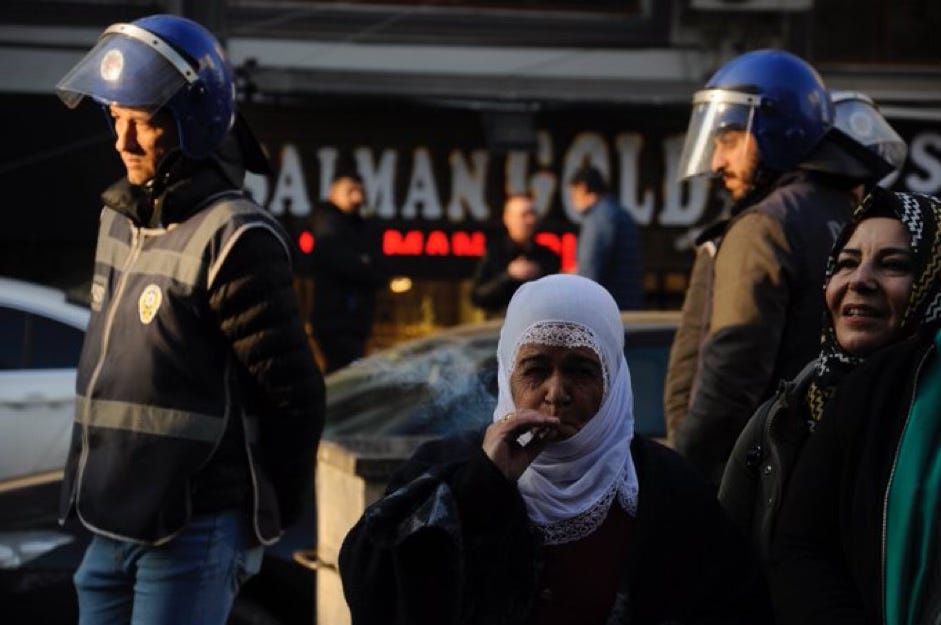Breaking Through Assimilation
“For the colonized, life can only materialize from the rotting cadaver of the colonist”
I often think about the conversation I had with my father, who fled Kurdistan for Istanbul in search of better opportunities and the chance to build a family here. One evening, we had a long conversation, one where I found myself blaming him, perhaps too harshly, for the assimilation he had experienced. I felt disconnected from my heritage, as I myself had a hard time not knowing Kurdish and speaking the language of the oppressor, calling it my “native.” Having faced the same experience without ever mentioning it, he said: “I came to Istanbul not knowing a word of Turkish. They bullied me until I learned it. In the process, I forgot most of my Kurdish. And now, I speak Turkish with an accent. Right now they still bully me, and I don’t truly belong to either language.”
From assimilated to non-assimilated Kurds living in Turkey and in Turkish-colonized Kurdistan, many face the harsh reality of an identity crisis. My experience as a victim of the Turkish government’s deeply rooted assimilation policies began in elementary school. Growing up hearing Kurdish only at home from my parents and relatives, while at school being forced to learn Turkish and recite the Turkish School Pledge, known as ‘Andımız’ — “I am Turk, I am true, I am hardworking” — being Kurdish wasn’t a concept I actively reflected on but it lingered quietly in the background of my life. Listening to nationalist songs played over the school bell as a reminder of breaks and being taught a history distorted by a nationalist perspective, all while knowing how difficult it is to be Kurdish in a school full of Turkish children — your very existence reduced to a joke. I didn’t truly know what it meant to be Kurdish, as I was told every day that I was Turkish. All I understood was that being Kurdish was considered a joke and being a brown woman didn’t make it any easier. “Are you a Kurd?” was less a question than a weapon, used not to learn about you but to demean you. It was often said when someone mispronounced a word, or simply because of how they looked. These microaggressions and acts of racism persisted even into college, where one might expect people to be more aware. Over time, you come to understand that racism knows no bounds. Even in a seemingly ordinary place like a pharmacy, my father was asked, “Where are you from?” — in order to learn his ethnicity. When he replied that he was Kurdish, the person said, “The bad kind or the good kind?”
At some point, most Kurds face a moment or event that radicalizes them. For me, it was learning about the Diyarbakir Prison and the sheer malice of the tortures inflicted on Kurdish people there. In time, I came to realize that Diyarbakir Prison was neither the first nor the last, and that Kurdish hatred was deeply rooted in this country. From genocidal campaigns to mass deportations, every Kurd has faced a different form of oppression and mine was assimilation. Even a Kurd who defends this country, claiming it gave us rights, is still a victim of something. He is a victim of not having an identity of his own, but of one imposed by the oppressor, an identity stitched together from fragments of the cultures in these lands and labeled as “Turkish culture.” And breaking free from this began with embracing the word “terrorist” — the easiest label to throw around, yet the heaviest to carry. As for them, being a terrorist is as simple as identifying as anything other than a “Turk.” If you are anything other, you are “the bad kind.”
Now, at 22, I face new struggles with radicalization. I lost friends who didn’t like who I was, but it hardly affected me, as I found a true community in return. I don’t feel I belong here, among people who would hate me if they knew who I really was; this place has never given me the feeling of “home.” I have to hide my real opinions to get a job or even to make friends which is an invisible prison that every Kurd is trapped in. Therefore, I will never be truly free, even though I feel a greater sense of freedom as I break away from assimilation. Ultimately, I felt the most free in that moment in London with my father — because we could truly relate to each other, even if our political views differed — freer than anywhere else I have had to be, except, of course, in a free Kurdistan.



Eferim ji te re, Bîrgul! I'm always happy to see content about Kurds on Substack. Please continue to write more! Serkeftin ji bo te! ✌🏼❤️☀️💚